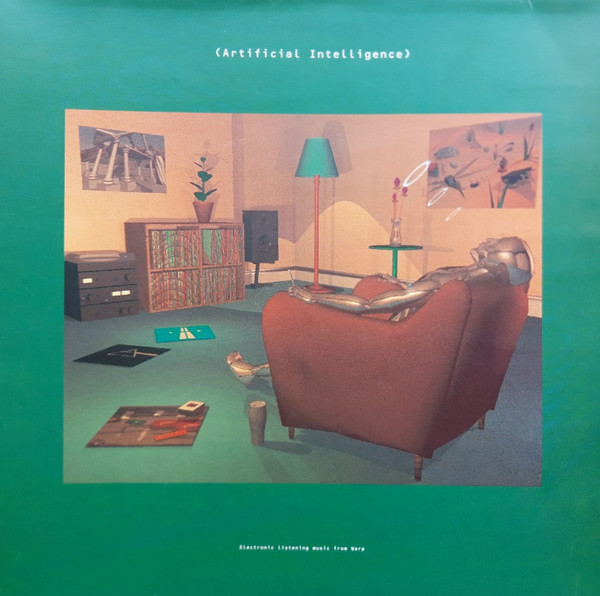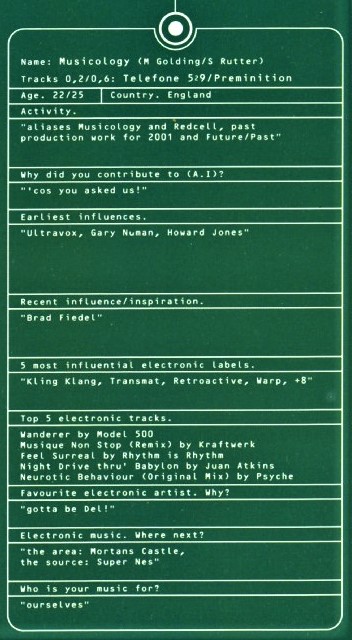My piece on Hou Hsiao-hsien's Millennium Mambo, a 2001 film partly set in the club scene of Taipei. The piece also looks at the struggles that movie-makers have had with capturing what happens on the ravefloor - and why they've evaded it for the most part. It's for the journal of The Metrograph cinema in New York, where a restored version of the film is currently showing as part of a Taiwanese New Wave series.
"My purpose was simple: to catch the feel, the pulse of rock, as I had lived through it. What I was after was guts, and flash, and energy, and speed" - NIK COHN - ------------------------------------------------------------------------------------------------------------------------------------------------------------------- "When the music was new and had no rules" -LUNA C
Wednesday, December 28, 2022
Friday, December 23, 2022
"An Idiotic Rave" / version galore
Sunday, December 11, 2022
"Electronic listening music from Warp"
A round-robin retrospective on Artificial Intelligence, Warp's landmark compilation - now 30 years old, Jesus, and being commemoratively reissued - convened by Daniel Dylan Wray, for The Quietus. I am one of the voices corralled. As you can imagine, the colloquy contains a fair amount of complaining, from various angles, about the term / genre / discourse "Intelligent Dance Music" a.k.a. IDM, which the comp unintentionally launched. "Electronic Listening Music", as flagged up on the cover itself, would have made for a much better, more neutral and non-inflammatory term (although even there's a subliminal hint still of a "music for the mind versus music for the body" dichotomy, with the implicit suggestion that people who are dancing are doing so mindlessly, they're not really listening).
There were a few responses of mine that were not used, and being a waste-not-want-not type (a child if not of the era of rationing then of someone who lived through rationing, which lasted up until 1956, right?), here are those morsels.
Asked about the argument that IDM is a white cooptation of back music, I offered this demurral:
"I didn’t really feel that was a factor. After all, there is a huge European history with electronic music – Kraftwerk, Tangerine Dream, Eno. A lot of postpunk and industrial. And a Japanese history too, with Ryuichi Sakamoto and YMO. But also with most of the IDM artists, they would be the first to acknowledge being inspired by Detroit techno and the early Chicago acid and so forth. I think there was a commonality felt with figures like Carl Craig and great respect for Underground Resistance and so forth.
"Where that became more of a thing was a bit later when you had the first-wave IDM artists adopting jungle’s breakbeat science techniques and then exaggerating them to the point where it was daft and undanceable. And there was a bit of attitude that irritated me then which was “look at us, we’re taking these ideas much further than the Junglists, who are all sheep, pandering to the dancers and the deejays”. It was an odd combo of coopting and arrogance. In fact, they weren’t taking the techniques any further than Dillinja or DJ Hype, they were just making them dysfunctional."
Quizzed about being "involved" in the IDM List and whether it was a real musical community.
"I wasn’t involved really, I don’t think I ever commented in a thread. But I checked it out, I subscribed to the list – just to see what people were talking about and how they talked about it. Being a student of discourse and fan rhetoric, I was interested to see how this unexamined superiority complex manifested in terms of judgements about which music mattered and why.
"I liked a lot of that kind of music – pretty much all the big names in IDM I thought were great or very interesting, and many of the smaller artists. Some of it is among the most beautiful music ever. I think its strong suit was melody and emotion. Well, you had interesting textures and sounds and atmospheres, but particularly melody and emotion was what it had to offer. If it had been called “emotronica” (admittedly a ghastly word!) then that might have been better. Not that hardcore dance musics are devoid of emotion, but it tends to be quite primary-color, unsubtle emotion, whereas in Aphex and Boards of Canada, et alc, you have a subtle palette of feeling – it can be poignant, eerie, mystical.
And finally, thoughts on the legacy of Artificial Intelligence:
"As I mentioned, I don’t think it’s that great a compilation, as a collection of tracks. There’s some good things and then as often with comps, the guest artists offer things that are maybe not their best work. It wasn’t a record I played more than a couple of times, I shouldn’t think. It’s more the throw-down of the title and the iconic cover image – it all added up to this big statement that Warp were making. Along with some of the things that were building in ’92 through to early ’93, the release really opened up a whole area of music that just grew and grew. Up to that point, you’d a few really excellent techno/house albums – 808 State’ 90 and Ex:Cel, LFO’s Frequencies, Ultramarine’s Every Man and Woman Is A Star. But it didn’t necessarily seem like a massive zone for the future. A lot of techno artists stumbled when it came to the album. But then I think with this comp, coming out at around the same time as Selected Ambient Works 85-92, suddenly it seemed a whole new space of possibility opened up.
From Artificial Intelligence's liner notes
Autechre's formative influences - almost all black music but as much electro and Miami Bass as house or techno
Sunday, December 4, 2022
feeling Gurley / the Gurley feeling
A playlist compendium of Steve Gurley's work as Rogue Unit and as a remixer - the jungle / d&B (pretty complete selection there - please point out ommissions) and then onto the speed garage / 2step era (less complete - he was in demand, churning the stuff out). Then in a chronology double-back, at the end there's a bit of 4 Horsemen of the Apocalypse and just a smidge of Foul Play ("Finest Illusion" - I remember Brad and John saying they had almost nothing to do with that track: they went off to deejay somewhere and when they came back, Steve had made the whole thing)
The Rogue Unit remixes like "Luv Dub", "Spread Luv", "Good To U", and especially "Peace Sign" and the naughty Princess "Say I'm Your Number 1" rebootleg are so so gorgeous.... as with other nuum auteurs, there's an identifiable signature here, particular fixtures / fixations... I don't have the technicals to pinpoint, but there's certain chord changes and harmonies he's drawn to... Even though working with vocal samples, he consistently gives them this thinned-out, stretched timbre, so that the diva sounds weak for love, ghostly and gaseous, wavering on the edge of expiry....
Thursday, December 1, 2022
Terminators
Well who knew there was an early "Terminator"?
(Well, I didn't)







